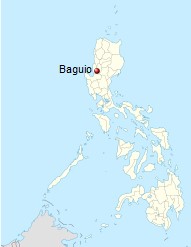Led by The Spirit: Interned by the Japanese
Meanwhile, the Filipinos had not abandoned the missionaries. The Bible school had not been able to continue because of the war, but the students had not forgotten their teachers. Several students tried to get permission to visit the missionaries. One young man in particular, Juan Taplac, was particularly persistent and actually managed to get into the camp although he was beaten by a guard. He delivered food to the missionaries, including a birthday cake for Leland Johnson. True to his word, either he, Juan Soriano, another Bible school student, or Rosendo Alcantara came every day. Their courage and sacrifice must have touched the missionaries deeply. Johnson would later report that Soriano and Rosendo Alcantara had saved their lives by ministering to them in this way.10
While this was happening, the Japanese propaganda machine was in high gear. The missionaries were fed a steady diet of lies regarding the progress of the war, including the idea that the Japanese had landed on the West Coast of the U.S. and were even dropping paratroopers on Denver, Colorado! Since they had no access to the truth, one wonders what they might have thought. In addition to the propaganda, they were interrogated by their captors as they thought they were spies. Torture was used in some cases, although it does not appear that the Assemblies of God missionaries were subjected to it.
 The internees developed their own routine to care for their needs and looked for ways to alleviate boredom. After just over a month in the camp, the missionaries, with the possible exception of Robert and Mildred Tangen, were unexpectedly released and allowed to return to their homes in Baguio, although they remained under close surveillance with limited freedom of movement. The Tangens seemed to have been released later for a short period of time. Apparently this was done to give the impression to Filipinos in Baguio that life should continue as normal.11
The internees developed their own routine to care for their needs and looked for ways to alleviate boredom. After just over a month in the camp, the missionaries, with the possible exception of Robert and Mildred Tangen, were unexpectedly released and allowed to return to their homes in Baguio, although they remained under close surveillance with limited freedom of movement. The Tangens seemed to have been released later for a short period of time. Apparently this was done to give the impression to Filipinos in Baguio that life should continue as normal.11
Free in Baguio
The release was providential since Helen Johnson was eight months pregnant and camp life had been hard on her. Had she given birth while in the camp, Leland would not have been able to help her since men and women were separated from one another. While there were still many privations, at least they were together. By the grace of God, Helen was brought to the Norte Dame Hospital in Baguio, where she delivered a healthy baby girl, whom they named Margaret Joy. While they certainly must have wondered what the future held, the Johnson’s joy was indescribable. They could not have known then the ordeal that they would go through with little Margaret before the war ended.
Appleby and Baldwin moved back into the house they had occupied before the war. They carried on clandestine prayer meetings in their home and were allowed to go to church. Johnson attended a meeting of the Japanese Religious Association with the understanding that some freedom or at least tolerance of religion would be allowed. When he learned that all sermons were to be written out and approved by the Japanese and that the Japanese flag was required to be draped over the doors of the cooperating churches, he refused to collaborate. In his own words about the meeting:
There was not a word of prayer offered. God’s guiding was not requested, and His blessing was not invoked. Most of us went away from the meeting feeling that we had almost perjured our souls, even though we had done no wrong. The whole thing was such a farce that we were deeply grieved.12
Back in the United States, the saints in the churches were rallied to pray for the internees. Perhaps it was just as well that they knew little of the conditions under which the missionaries were living. Efforts to contact them were largely unsuccessful.13 Noel Perkin was not content to just pray and tried to send as much as ten thousand dollars to the missionaries through another missions organization, but the funds were embezzled.14
Back in Baguio, life became more complicated. The Japanese did not provide food for those outside the camps and money for food was hard to find. Hearing their children’s cry for food was almost more than the Johnsons could bear. Leland Johnson was permitted to go to market three times a week, but his money eventually ran out. Appleby had managed to hide a hundred dollar bill from the Japanese; the money came in handy when the missionaries had needs. The Johnsons were unable to secure a loan and were forced to sell their extra belongings which they had stored in the air raid shelter Johnson and Tangen had built.
Category: Church History, Winter 2020


